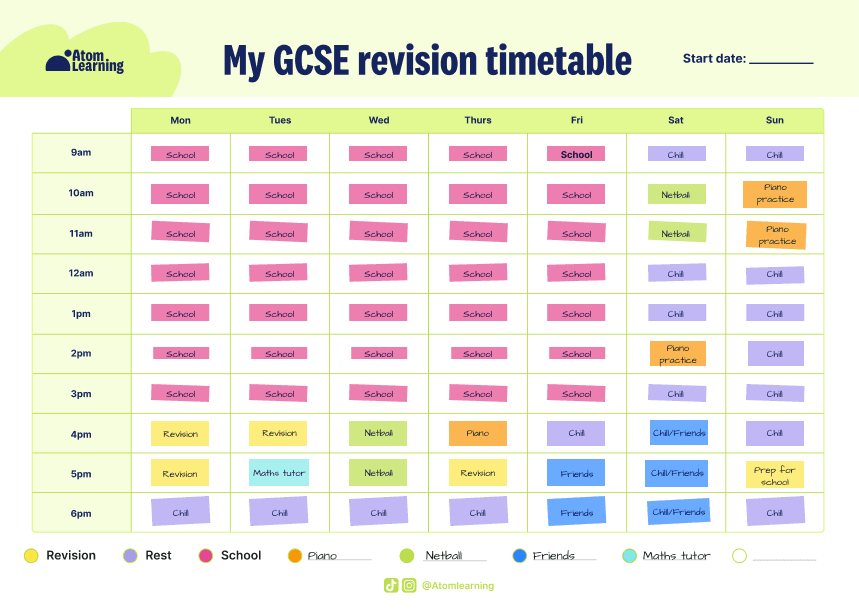How to create a GCSE revision timetable that actually works
By Atom | Nov 18, 2025, 1:28 PM
Contents
Setting yourself up for success in your GCSEs starts with good preparation. Creating a revision timetable and planning how you will spend your revision time is a great way to keep yourself on track as you get ready for exam season.
But how do you create an effective revision timetable? Check out our guide to creating a GCSE revision timetable that actually works, and get ready to smash your revision.
Why do I need a revision timetable?
With nine (or more!) GCSE exams to prepare for, it’s a good idea to lay out what you want to revise and when, so you can cover all the topics you need to feel confident on exam day.
It’s also smart to start early. Breaking your revision into smaller chunks and focusing on the areas you find most difficult will give you time to properly understand and absorb the learning you need. Last-minute cramming is not only a stressful way to revise, it’s also not the best way to absorb information.
In fact, consistent, short bursts of study, spaced out over a longer period of time, will help you consolidate your memory and revise more effectively. To do that, you need a plan. Read on to find out how.
How do I make a good revision timetable?
A good revision timetable will help you structure your revision goals by subject and organise your week. Remember, this timetable is for you. You’re looking to be consistent and fit study into your schedule, not to overwhelm yourself.
It’s a good idea to plan your revision term by term. For example, in the autumn term, you’ll want to focus on consolidating your learning and working on topics you find harder. Whereas in the Spring, as the exam dates approach, it’s a good idea to put time into covering topics you haven’t visited in a while to make sure your memory is fresh.
Take a look at the example revision template below. We’ve balanced school, homework, sports, and socialising with revision to give an idea of what a balanced week looks like.

Make sure you’re realistic about how much revision you can do each week and what your goals are. We’ve also included a revision planner and more advice in our free revision pack, to help you revise the areas you need most.
Using a revision template is a great way to get organised! You can download our tailor-made revision pack, which includes a GCSE revision timetable template, planner and revision tips below.
Free GCSE revision templates
Get started on your journey to GCSE success. Download your free revision templates and guide to effective revision today.
Top healthy GCSE revision tips:
1. Stick to a consistent schedule
Revising at the same time each week helps you get used to focusing during those time slots, improving your concentration. You’re also less likely to skip sessions when they’re a part of your routine.
Short bursts are better than cramming. So think strategically about when you can fit a half-hour or hour revision session into your weekly schedule.
2. Take regular breaks
Taking regular breaks helps to prevent burnout and actually improves knowledge retention. With methods like the Pomodoro technique, you can plan breaks into your study sessions.
During your breaks, leave screens behind, move around, and get yourself a drink and a snack.
3. Get enough sleep
Believe it or not, sleep is crucial for memory consolidation. Without enough sleep, you’ll not only struggle to remember your revision but also find it hard to stay motivated. Aiming for 7-9 hours per night, depending on what your body needs, will help you perform better.
4. Stay hydrated and eat well
A top tip that works at every life stage is drinking plenty of water and eating well, which will help you concentrate better and feel more energised. Aim for eight glasses of water daily, and try brain-friendly snacks like nuts, fruit, or yoghurt.
As tempting as it is to have caffeinated or sugary drinks, they can cause energy crashes, so be careful.
5. Create a comfortable, distraction-free study space
Depending on your home set-up, try to find a comfortable space to study where you can concentrate. If you have a desk, keep it tidy and well-lit. If you’re studying at the kitchen table, make sure to set up your space properly.
Putting your phone away is helpful or using it as a timer can stop you from scrolling. You can use your revision calendar to motivate you too, ticking off topics as you become more confident.
Guide your free revision guide for more top tips, including 10 revision techniques to try!
Creating a revision timetable will help you organise your time to revise all of your GCSE subjects better. To make sure you’re ready for the summer exams, make sure you set a realistic plan and follow healthy study tips. Good luck!
Don’t miss Atom’s GCSE giveaway!

Six months. Six epic prizes. Six chances to make the GCSE season unforgettable.
We’re launching Atom for GCSE prep in 2026, and to celebrate, over the next six months, we’re giving away thousands of pounds worth of prizes to help your child level up their GCSE revision.
Here’s a taste of what’s up for grabs:
The latest Apple tech, including an iPad Air, Vision Pro and more
Festival tickets for Boardmasters and Reading 2026
Europe interrail passes and £1,000 spending money
…and that’s just a few of the amazing prizes available.
Our first two winners have already taken home incredible prizes! Find out who they are and what they won in our latest giveaway update and keep an eye out for news of our November winner.
It’s free to join. UK only. Full T&Cs apply.
Contents
